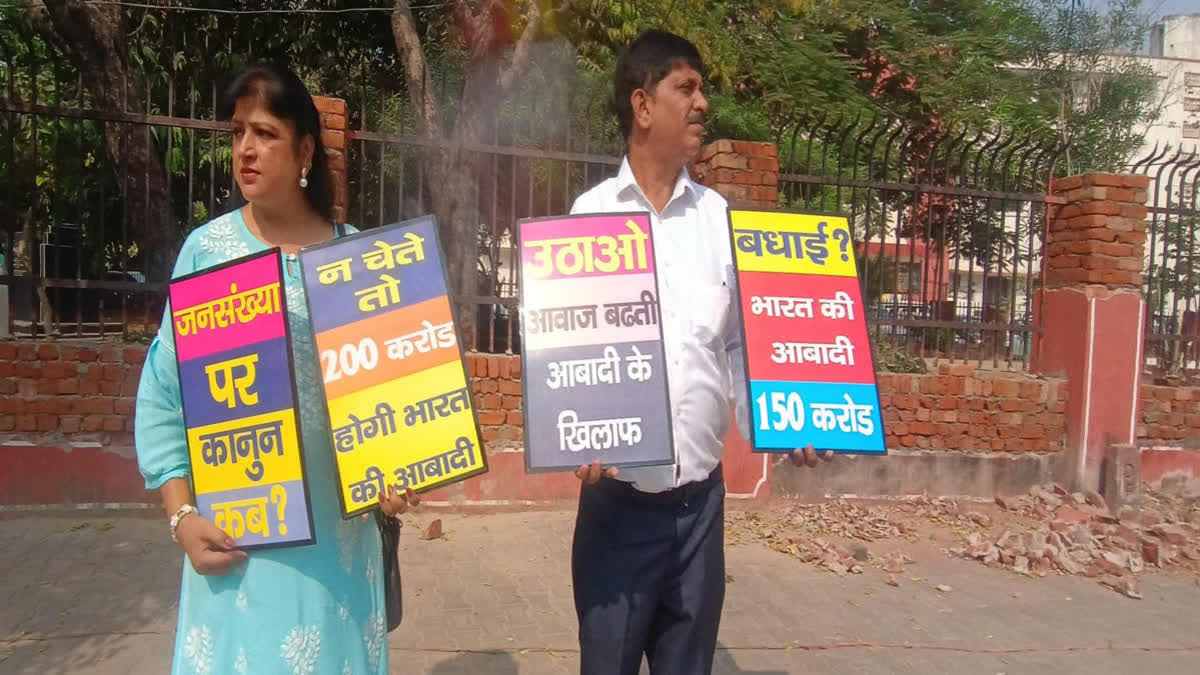Nainital: In today's world where everyone runs helter-skelter to survive, who thinks about the pressing issue of rising population of the country or the continent? The Talwar family from Meerut does. The family chose to launch a crusade in their own way to create awareness and how! By walking ahead backwards. It may sound an oxymoron, but it is an attempt by the four members of Dinesh Talwar's family - wife Disha, and their two children, Yash and Simran.
They have dedicated the last 30 years to raising awareness about the perils of uncontrolled population growth. Their unique campaign—a reverse march—has taken them to over 400 cities across India, where they walk backwards to symbolize the need to reverse the growing population crisis.
“We walk backwards to show that if we don’t act now, India’s progress will also take a backward step,” explains Dinesh, who started this campaign with his wife in 1994. “It’s a simple yet powerful way to grab attention and make people think about the implications of a growing population.”
A Family’s Lifelong Mission
The Talwars’ journey began as a small, local campaign in their hometown of Meerut. Over time, it grew into a nationwide movement. Alongside their marches, they’ve written over 1.5 lakh letters to successive governments, urging them to introduce a population control law. From school assemblies to train stations, they use every opportunity to spread their message.
“Our children have grown up walking backwards,” says Disha with a smile. “Yash and Simran were just kids when we started, and now they’re adults who continue to march with us. It’s a family mission.”
The Symbolism of Reverse Walking
The reverse march is more than just a striking visual. It conveys a profound message about the need to reverse the damage caused by unchecked population growth. “Walking backwards catches people’s attention immediately,” says Yash, their son. “It sparks conversations, and that’s exactly what we want—to make people aware and think critically about the issue.”
Their recent march in Nainital saw the family walking along the city’s Mall Road and Pant Park, holding banners and talking to onlookers. “We’ve received mixed reactions,” says Dinesh. “Some people are curious and supportive, while others dismiss us as eccentric. But that’s part of being change-makers.”
Unique Dedication
Despite their tireless efforts, the Talwars have faced numerous challenges. Over three decades, they’ve petitioned every Prime Minister since Narasimha Rao, but they have yet to secure a meeting. Their campaign has also required personal sacrifices. The family once ran a business, but financial constraints forced them to shut it down. Dinesh now works in insurance to support their household and their campaign.
“People often ask us why we do this when it hasn’t changed anything yet,” says Disha. “But we believe that persistence is key. Change takes time, and we’re willing to walk backward for as long as it takes.”
The Growing Population Crisis
India’s population has skyrocketed over the past few decades. In 2011, the census recorded a population of 121 crore. By 2024, estimates suggest the number has reached 145 crore. With basic resources like housing, education, and healthcare struggling to keep pace, the situation is dire.
“Population growth affects everything—from jobs to education to the environment,” says Dinesh. “If we don’t act now, the future will be bleak for the next generation.”
The Talwar family is optimistic about the current government. They plan to march to Delhi’s Jantar Mantar next, hoping to finally secure a meeting with Prime Minister Narendra Modi. “We believe the Modi government understands the importance of population control,” says Disha. “We’re not asking for much—just a law that ensures sustainable growth and a better future for everyone.”
For now, the Talwars continue their reverse march, their determination undeterred by setbacks. “Each step we take is a reminder of what’s at stake,” says Dinesh. “We can’t move forward as a nation without addressing this issue. And so, we’ll keep walking backwards until we’re heard.”



